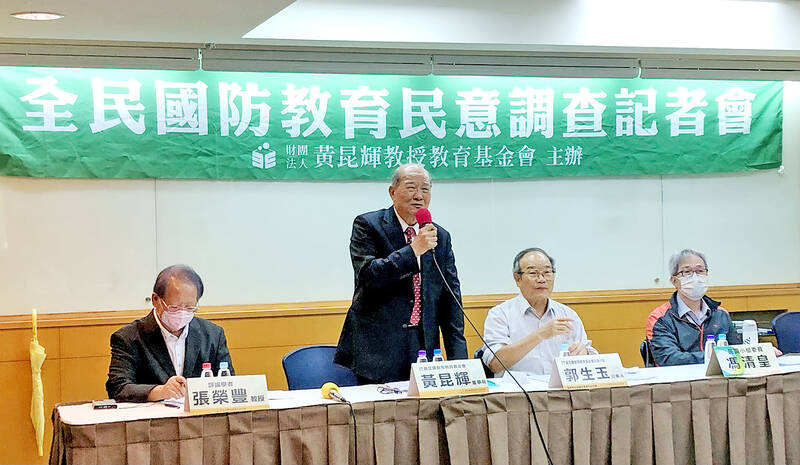More than 80 percent of respondents to a poll said they believe Taiwanese should be responsible for their country’s defense, a foundation said yesterday.
Professor Huang Kun-huei Education Foundation chairman Huang Kun-huei (黃昆輝) said he conducted the survey out of concern over national security issues, particularly in light of Russia’s invasion of Ukraine.
The foundation’s survey asked respondents to comment on the nation’s defense training, battle readiness and education about national defense.

Photo: Chang Wei-chen, Taipei Times
Among those who responded to the survey, 83.3 percent said that Taiwanese must be ready to defend the nation on their own, and 85.8 percent said that nationwide education about national defense should better emphasize the importance of maintaining national security.
“This year has been a turbulent one. I wanted to see whether Russia’s invasion of Ukraine had served to enlighten the public of defense issues,” Huang said.
The survey also found that 76.3 percent of respondents agreed with the need to introduce national-defense education into public schools and communities, 75.4 percent said that the public should receive defense and survival skills training, and 75.2 percent said that Taiwanese should be better trained in disaster-response measures.
A further 62.3 percent said the public needs better training in media literacy to identify false information, and 53.4 percent said the public should be trained in basic combat skills.
Foundation director Feng Ching-huang (馮清皇) said that current defense education in schools — which focuses on performance-drills competition, target training, and exercises held during summer and winter breaks — is inadequate.
The results of the survey showed that the majority of the public agreed with his assessment, he said.
Foundation poll committee convenor Kuo Sheng-yu (郭生玉) said only 29.7 percent of respondents knew there were defense education programs in schools, which should serve as a warning sign.
The poll finding that only 41.4 percent of Taiwanese would be willing to sacrifice themselves for national defense was also a sign that the public lacks awareness of the significance of defense. He suggested that the government could work with civic organizations to raise awareness of defense issues.
Taiwan Association for Strategic Simulation secretary-general Chang Jung-feng (張榮豐) expressed concern over the survey’s finding that 70.5 percent of respondents believed the US would come to Taiwan’s aid in the event of an attack by China.
“Peace does not come cheap. Responsibility for one’s own defense should not be simply a slogan,” he said. “Taiwanese must wake up. Participation in national defense doesn’t necessarily mean carrying a rifle into battle. Everyone can contribute according to their strengths.”
The poll, which was conducted from June 18 to 21, gathered 1,070 valid samples from respondents 20 and older. It has a confidence level of 95 percent and a margin of error of 3 percentage points.

Alain Robert, known as the "French Spider-Man," praised Alex Honnold as exceptionally well-prepared after the US climber completed a free solo ascent of Taipei 101 yesterday. Robert said Honnold's ascent of the 508m-tall skyscraper in just more than one-and-a-half hours without using safety ropes or equipment was a remarkable achievement. "This is my life," he said in an interview conducted in French, adding that he liked the feeling of being "on the edge of danger." The 63-year-old Frenchman climbed Taipei 101 using ropes in December 2004, taking about four hours to reach the top. On a one-to-10 scale of difficulty, Robert said Taipei 101

A preclearance service to facilitate entry for people traveling to select airports in Japan would be available from Thursday next week to Feb. 25 at Taiwan Taoyuan International Airport, Taoyuan International Airport Corp (TIAC) said on Tuesday. The service was first made available to Taiwanese travelers throughout the winter vacation of 2024 and during the Lunar New Year holiday. In addition to flights to the Japanese cities of Hakodate, Asahikawa, Akita, Sendai, Niigata, Okayama, Takamatsu, Kumamoto and Kagoshima, the service would be available to travelers to Kobe and Oita. The service can be accessed by passengers of 15 flight routes operated by

Taiwanese and US defense groups are collaborating to introduce deployable, semi-autonomous manufacturing systems for drones and components in a boost to the nation’s supply chain resilience. Taiwan’s G-Tech Optroelectronics Corp subsidiary GTOC and the US’ Aerkomm Inc on Friday announced an agreement with fellow US-based Firestorm Lab to adopt the latter’s xCell, a technology featuring 3D printers fitted in 6.1m container units. The systems enable aerial platforms and parts to be produced in high volumes from dispersed nodes capable of rapid redeployment, to minimize the risk of enemy strikes and to meet field requirements, they said. Firestorm chief technology officer Ian Muceus said

MORE FALL: An investigation into one of Xi’s key cronies, part of a broader ‘anti-corruption’ drive, indicates that he might have a deep distrust in the military, an expert said China’s latest military purge underscores systemic risks in its shift from collective leadership to sole rule under Chinese President Xi Jinping (習近平), and could disrupt its chain of command and military capabilities, a national security official said yesterday. If decisionmaking within the Chinese Communist Party has become “irrational” under one-man rule, the Taiwan Strait and the regional situation must be approached with extreme caution, given unforeseen risks, they added. The anonymous official made the remarks as China’s Central Military Commission Vice Chairman Zhang Youxia (張又俠) and Joint Staff Department Chief of Staff Liu Zhenli (劉振立) were reportedly being investigated for suspected “serious